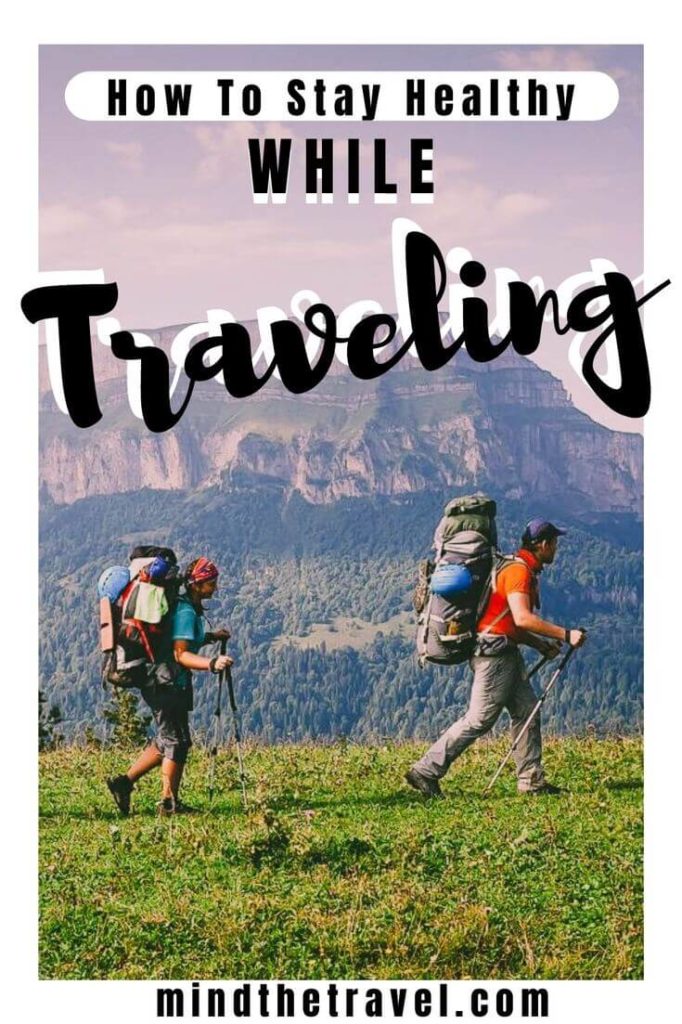How to Stay Healthy While Traveling: 8 Essential Tips
As a traveler who is also an occasional expatriate, I am often asked how to stay fit while traveling and how to stay healthy when you travel for work. So I thought a post explaining exactly how to stay fit and healthy while traveling in general, and some tips for tackiling most common questions around staying healthy while traveling would go a long way.
After over a decade of traveling, I’ve come to understand that one’s health is their most precious asset. This is the fundamental principle I bear in mind each time I embark on a journey.
Venturing to foreign lands and engaging with diverse cultures can exert significant strain on your immune system.
While we often seek a simple and universal remedy, prioritizing the well-being of your immune system is a crucial component of maintaining good health while on the road.
Your immune system serves as your staunch ally, acting as a shield against infections and harmful bacteria. A robust immune system acts as a safeguard, shielding you from various illnesses and viruses.

Given the multitude of adverse effects of tourism on the environment, frequent travel may have detrimental consequences on your health.
How To Travel Without Leaving Home: Plan a Virtual Trip In 10 Easy Steps
The impacts of jet lag, dry airplane conditions, unsafe water, and inadequate sanitation, coupled with prolonged sun exposure, excessive alcohol consumption, overeating, and extended flights, contribute to why many travelers fall ill on their journeys.
While it’s challenging to avoid flights, air-conditioned buses, tempting cocktails, delectable pastries, and vibrant nightlife, adopting simple strategies can help us maintain our well-being and make healthier food choices while traveling.
Achieving a balance is key, so allow yourself to enjoy the foods you love without guilt.
It’s the little things that count, and it’s okay to skip a single workout or savor a slice of your favorite pizza without feeling guilty.
1. Pay Attention to Your Surroundings
We are all aware that doorknobs, bathroom sinks, and seats are breeding grounds for bacteria and germs.
Therefore, it’s essential to carry hand sanitizer containing at least 60% alcohol or disinfect surfaces when at home.
If you encounter a visibly unclean doorknob, it’s advisable to wash your hands thoroughly post-contact.
While maintaining good hygiene is crucial for staying healthy while traveling, there’s no need to become overly fixated on germs.
A robust immune system plays a vital role in combating potential pathogens, even when preparing prepackaged meals for travel.
In shared spaces like public transport or buildings, it’s vital to acknowledge the diverse health statuses of individuals present.
Despite efforts to create a personal space bubble, interactions with others are inevitable, warranting mindfulness about hygiene and health.

Lessons I’ve Learned From Traveling The World
Consider an airplane as a colossal metal vessel with metallic wings, circulating recycled air.
When seated near a coughing passenger, your defense lies in having a face mask at hand and relying on your immune system.
I highly recommend against using airport blankets and pillows since their cleanliness and sanitation are often uncertain.
2. Get Vaccinated
Opting for vaccinations depending on your destination country can significantly enhance your safety and well-being.
When planning visits to developing nations or regions near the equator, it’s wise to shield yourself from hazardous tropical illnesses.
It’s essential to stay updated on evolving immunization guidelines.
Prior to my trip to Kenya, I prioritized obtaining comprehensive protection through appropriate vaccinations.
Certain travel vaccines, distinct from routine adult immunizations, can be costly. But sometimes these are essentials if you want to comprehend the art of staying clean and healthy while traveling.
Conduct thorough research to ascertain the vaccination requirements mandated by countries for specific diseases.
Things Nobody Tells You About Visiting Beijing
Planning a vaccination schedule demands careful consideration, especially since certain vaccines necessitate multiple doses.
It’s crucial to allocate sufficient time before your departure to accommodate all required vaccinations.
These vaccines shield you from ailments such as Hepatitis A and B, influenza, and typhoid.
For tailored recommendations based on specific countries, visit the CDC travel website, offering a comprehensive array of disease-related metrics.
3. Prevent Overeating
Local cuisine tends to be irresistibly delicious, making it challenging to resist indulging.
Exploring new destinations can easily lead to overeating and bingeing, impacting your organs and straining your digestive system.
When traveling with a companion, consider sharing meals at restaurants. By doing so, you can effectively manage portion sizes and calorie intake.
Opting for a shared starter and main dish not only helps maintain your waistline but also keeps your expenses in check.
As a solo traveler, navigating portion sizes can be trickier, especially in countries where control is limited.
In such instances, visiting nearby supermarkets or grocery stores provides an opportunity to make healthier choices and manage weight while on work-related travels.

How To Stop Procrastinating When Trip Planning
Opting to purchase food from local supermarkets enables me to exercise precise control over my food portions, storing them in compact containers.
Unsealing another package naturally prompts me to monitor my consumption levels more closely.
Carrying my own snacks like apples and bananas ensures I have sustenance wherever I go throughout the day.
I also favor items such as protein bars, trail mix, nuts, and dried fruit due to their convenient size for peripheral storage.
While maintaining practicality, it’s vital not to miss out on the culinary delights and cultural experiences offered by local cuisine!
Opt for soft-cooked meals that are low in fiber yet high in protein and low in carbs, as these are generally easier to digest.
Embrace a diet rich in fresh fruits and vegetables, and include fermented probiotic foods like sauerkraut, pickles, and yogurt for their health benefits.
Additionally, supplementing with extra Vitamin C and B can naturally fortify your immune system.
4. Stay Active While Travelling
Embracing an active lifestyle plays a crucial role in disease prevention and overall well-being.
Being a passionate hiker, I engage in daily walks, a habit that aids in weight management even during business travels.
My love for walking extends to various activities. I walk to grocery stores, explore new sights, take leisurely strolls along the beach, and even trek to coffee shops for writing sessions!
Walking not only fortifies muscles but also bolsters immunity against infections.
Engaging in moderate physical activity is recognized for enhancing memory retention, sharpening focus, and staying healthy while traveling abroad.

How To Travel Without Leaving Home
Balancing exercise with travel commitments can often be the last thing on your mind, especially during work trips.
In the past, I’ve found myself in this predicament, juggling a demanding schedule that leaves little room for workouts.
Similarly, while on vacation, the desire for relaxation may overshadow any inclination towards physical activity.
If you relate to this scenario, consider incorporating simple travel workouts regardless of your location.
Exercises like push-ups, sit-ups, and air squats are effective in combating jet lag symptoms and stress management.
Engaging in activities such as burpees, swimming, and jogging can effectively cleanse your body and lungs.
Personally, I maintain my activity levels by blending hiking with sightseeing, seamlessly integrating physical movement into my travel experiences.
Many European cities offer active tours that provide an enjoyable means to explore new destinations while burning calories.
5. Protect Yourself From Mosquitoes
With the Zika virus on the rise, mosquitoes have transformed from mere buzzing insects to dreaded disease transmitters.
Mosquito bites can be a source of distress, particularly in regions heavily populated by these biting pests.
Whether you are traveling to a malaria-prone region or simply aiming to evade pesky bug bites, here are some valuable strategies to combat mosquitoes:
- Use tightly fitting mosquito screens on windows and doors at night;
- Wear long-sleeved clothing when outdoor;
- Use permethrin-coated nets if possible;
- Mosquito bites are itch;
- Having an insect repellent is essential when traveling to dengue fever and malaria endemic areas. Bug spray containing a high level of DEET (diethyltoluamide), is one of the most effective ways to repel mosquitoes and other bloodsucking insects. I would strongly recommend consulting with your doctor before using it;
- Try to reduce strong odors when outdoors. Body odor, perfume or deodorant attract mosquitoes, that is why they like some people more than others. I usually take a shower with neutral soap and shampoo before hiking;
- Stay away from stagnant water and flooded forests during the twilight hours. Since these are best places for mosquito breeding;
- Include vitamin B1 and garlic in your diet. 100 mg of vitamin B1 per day can protect you from mosquito bites. It makes your skin allocate a specific smell that repels mosquitoes;
6. Wear Sunscreen
Maintaining fitness while backpacking or staying in shape on vacation becomes challenging when facing sunstroke or overheating.
I highly recommend meticulous planning in advance to prevent such issues, especially when visiting beach destinations.
Essential items include a good pair of sunglasses, crucial for safeguarding your eyes against UVA, UVB, and HEV light rays.
When preparing for a beach outing, don’t forget to pack sunscreen with a high SPF to shield yourself from the sun’s harmful effects.
Sunstroke is a significant concern, as excessive sun exposure can lead to vision impairment, eye cancers, and cataracts.
Individuals with light-colored eyes often exhibit heightened sensitivity to light, leaving their eyes vulnerable to the adverse impacts of UV rays.
A friend of mine, diagnosed with photophobia or light sensitivity, faces challenges during sunny beach days.
It’s advisable to avoid direct sunlight during peak hours to minimize exposure and potential discomfort.
7. Stay Hydrated
Emphasizing the importance of staying hydrated throughout the day may seem like stating the obvious.
Dehydration can lead to various health issues and chronic diseases, as well as stress, headaches, back pain, and allergies.
Exploring new destinations is incredibly exhilarating! Upon reaching a new place, the eagerness to immerse myself in the surroundings is palpable.
However, this excitement and the constant stream of new experiences can sometimes lead to forget about some items that help you stay healthy while traveling. Such as water bottles for keeping you hydrated.

What to Know Before You Climb Adam’s Peak, Sri Lanka
Take initiative by always having a water bottle on hand and maintaining regular hydration.
Preventing dehydration is crucial if you aim to stay fit and healthy while traveling.
Avoid any indications of dehydration by ensuring you consume an adequate amount of water.
The standard water intake should range between 2-3 liters daily, considering factors such as your size, gender, activity level, and more.
Let’s prioritize adequate hydration by increasing water intake to a minimum of 2-3 liters per day, with a suggestion to double this amount when temperatures soar.
8. Get Enough Sleep
Late nights, early morning excursions, extended flights, and time zone changes can significantly impact your eating and sleeping routine.
For a seasoned traveler like myself, aligning with the body’s innate sleep-wake rhythm can prove challenging, particularly at the start of a new adventure.
During longer journeys, it’s generally easier to secure sufficient rest, ensuring you maintain physical strength and vitality for a healthy lifestyle.
Conversely, on shorter trips spanning just a couple of weeks, you may face some circadian rhythm disorders.
How to Stay Healthy While Traveling Abroad: Final Thoughts
Traveling involves unwinding and discovering new destinations, maximizing the time away from your usual routine.
Consider tips for staying healthy when traveling for your next trip to return feeling rejuvenated and in good health!
Do you need any further advice on staying healthy during your travels?




